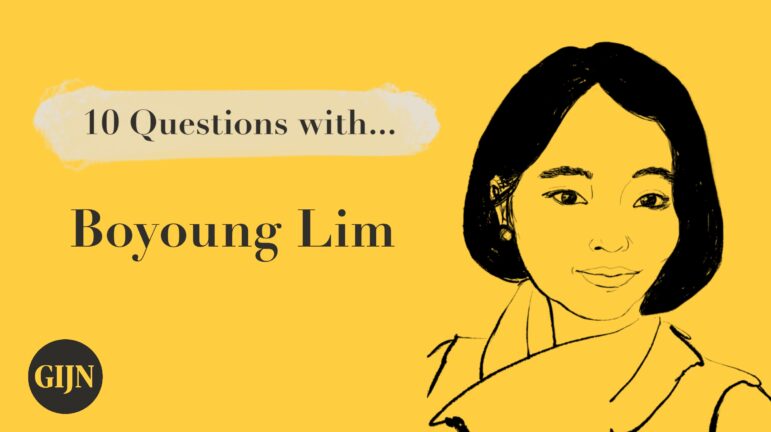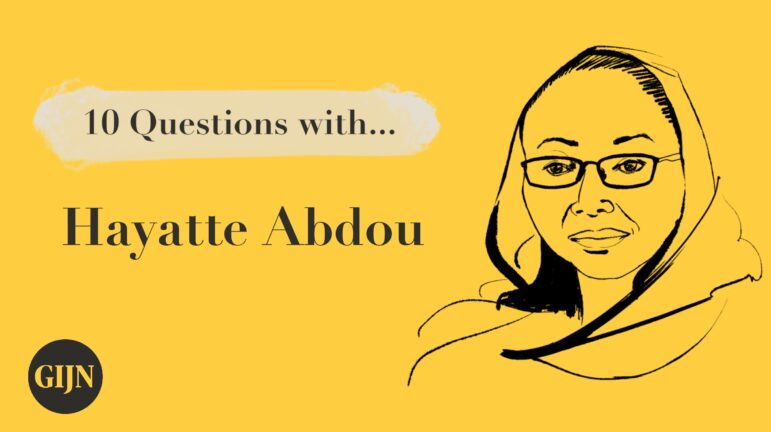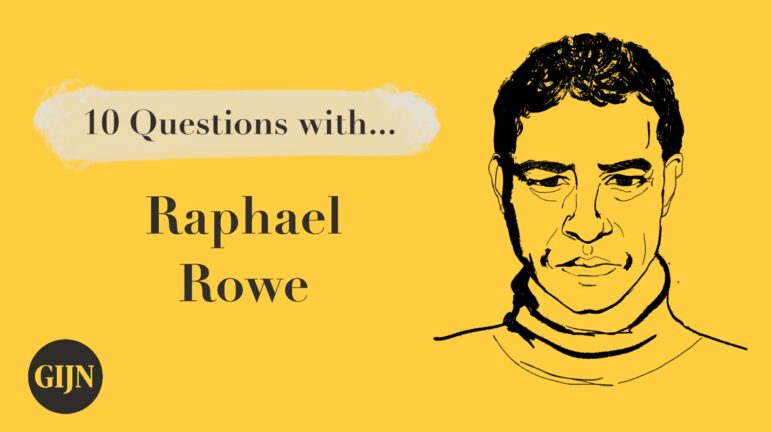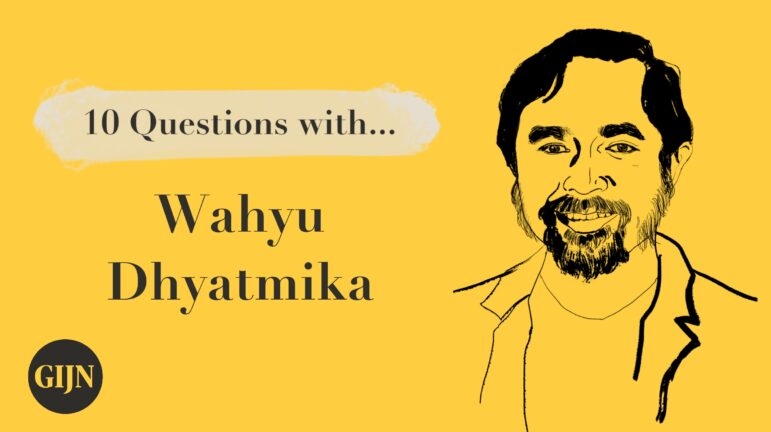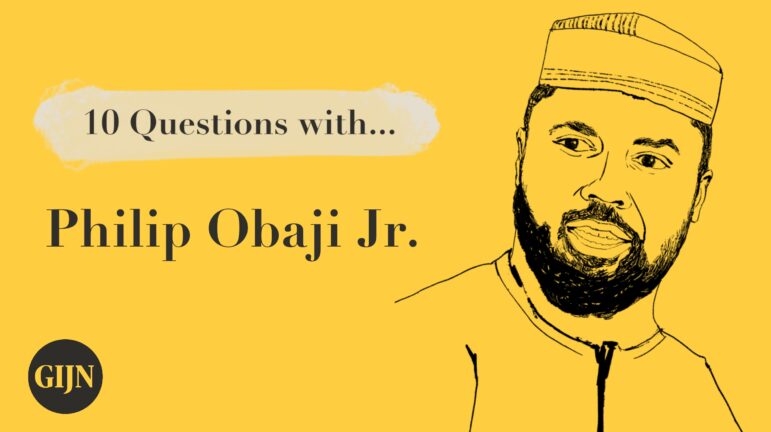

Illustration: Smaranda Tolosano for GIJN
An Unexpected Journey: Sports TV Host to Investigative Journalist and Star African Correspondent
Read this article in
Last year, The Daily Beast’s correspondent for West and Central Africa, Philip Obaji Jr., was named by One World Media as their International Journalist of the Year, and nominated for Free Press Unlimited’s Free Press Award 2023. A year earlier, he had scooped the Jaime Brunet International Prize.
Yet, having started out as a sports TV host, Obaji’s journey into international investigative journalism was almost fortuitous. In 2015, while working for an NGO providing children with education, Obaji traveled to the Nigerian city of Maiduguri, the birthplace of the terror group Boko Haram, to document why kids in the areas were not in school and why Boko Haram was recruiting children to join its jihadist movement.
On his return from the trip, Obaji wrote about his experience and shared his story on Facebook. It caught the eye of a reporter at The Daily Beast, a US digital news site, who passed it on to her editors. Shortly after, they offered him a chance to write for The Daily Beast, which he’s done for nearly 10 years now, alongside other freelance reporting assignments.
In this interview, part of GIJN’s ongoing series talking with leading investigative journalists, Obaji discusses the challenges of doing investigative reporting in West and Central Africa, the tools that have made his work easier, and why he hopes international media organizations can place more trust in indigenous investigative reporters.
GIJN: Of all the investigations you have worked on, which has been your favorite and why?
Philip Obaji Jr.: Well, it’s very difficult to say which is my favorite. I have a couple of stories that were really very taxing, stories I will never forget. But let me talk about the most recent one I did a couple of weeks ago in the Central African Republic. I would say it’s my best because anything could have happened to me; I could have died in the course of this investigation, or been arrested at the border, or jailed for libel for a long time.

Obaji Jr.’s reporting was recognized at the International Center for Journalists (ICFJ) Tribute to Journalism event in Washington, DC in November 2023. Image: Screenshot, ICFJ, LinkedIn
I didn’t want to take that risk by flying into Bangui, so I thought the best way into the country would be by the land border. I was going to a place where a lot of abuses had occurred, in communities where the Russian Wagner Group had attacked local miners and intimidated local communities. So, these communities were not very far away from the border with Cameroon. I made that journey in December. And somewhere close to Gallo [village], I was held hostage by some armed men from the CPC, the Coalition of Rebel Groups in the Central African Republic. I was held there for hours, and I had to beg my way out, so to speak, because when they realized that I was a journalist who really wanted to talk about the problems that people in local communities were facing, they let me go after maybe six hours or so.
I stayed in the Central African Republic, conducting interviews and talking to people from Koki, a mining community in the north of the Central African Republic where dozens of people were killed by Russian paramilitary in September. So, it was a very difficult investigation to achieve because I had nowhere to sleep; I slept in the open. One day, I even slept on the streets because I needed to get the facts out; I needed to speak to some people who really would tell me something about people who were massacred.
So, on my way back to Cameroon, I stopped to interview some people who were fleeing from the country. Some soldiers saw me doing so, and then they came and arrested me, took me to one of their offices, and detained me overnight. I was beaten with belts and horse whips, and my camera and phone were confiscated. But somehow, after being released the following day, I went back to Cameroon without my phone and camera, and then I returned to the Central African Republic. So, it’s the most dangerous work I’ve done since I became a journalist a couple of decades ago. I don’t want to say… favorite is maybe not the word I want to use, but it is the most daunting task I’ve ever had as a journalist yet.

Philip Obaji Jr. covers sub-Saharan Africa for US digital news site The Daily Beast. Image: Screenshot, The Daily Beast
GIJN: It sounds like safety and security are the biggest challenges you face as an investigative journalist in the region you cover. Are there any other big challenges you wish to talk about?
PO: When you pursue the kind of stories that really indict people, the challenge you face is either you are arrested or targeted in some way. So, for me, that’s the challenge I have faced. Human trafficking is a huge problem in West and Central Africa, and I have investigated so many cases of human trafficking. Each time I do, I face many challenges, especially with people emailing me and warning me to stop.
Most of my work in the last couple of years has been reporting on the Wagner Group and also on human trafficking. People don’t talk about Wagner that much because the Russian Minister of Defense is now in charge of the operations of Russian paramilitaries in Central Africa, but Russian operations have been very dangerous, and people are warning me to stop. The second challenge has been the funding because, many times, journalists will have ideas on how to pursue stories that really will make a mark and will create change, but it costs a lot of money. There are some stories that have been pursued for two-and-a-half years. If I had the funding I needed to make it quicker, I would have been able to finish in, say, about six months to one year, but it was difficult raising that much funds because I needed to do a lot of traveling.
The other challenge I face is this: Many times, I don’t really get the tips I want from sources to pursue a story, so I have to go to the places and then hope that I can get something great from my trip. Oftentimes I do so with my own money, and then I hope that what I will be paid for writing this story will at least cover what I spent on transportation and maybe accommodation… I do it because I believe that I must tell a story the best way I can. That’s the personal choice that I’ve made.
GIJN: What’s been the greatest hurdle/challenge that you’ve faced in your time as an investigative journalist?
PO: I had a lot of concerns recently. One was whether I was monitored or spied on. Some of my contacts in the Central African Republic told me that some people might know what I was doing. So, in 2022, I applied to Reporters Without Borders’ digital security training program in Berlin and I was successful in the application. So last year, I studied digital security. It is a program for journalists that aims at making sure that journalists understand how to protect themselves digitally because, of course, we work digitally as journalists. It was a very intense program for four months. I was learning new tools, new ways, and new habits as to how to keep myself safe and protected from digital harm. So that was very, very important.
I realized in the course of undertaking the program that many times, as journalists, we use many unsecured platforms to work and do not understand how to embrace encrypted platforms for messaging and also for typing for work. I gained a lot of very important tools that became important in the course of my work. A lot of journalists in Africa really need to have that training and that’s why, since I came back, I have been carrying out smaller trainings for journalists in Nigeria as to how to keep themselves digitally secure. I also realized that a lot of journalists didn’t even understand anything about digital security until I introduced this issue to them.
GIJN: What is your best tip or trick for doing interviews?
PO: I try to get prepared for every interview. Even with this one we are doing, once you told me, ‘Let us do this,’ I even had to go and search for you.
I Googled Benon Oluka, and then with every result I got, I clicked to read more about you, to understand your work as an editor for GIJN. I make sure I prepare myself very, very well, research the issue, research the person, and then I get set. And I try to ask open questions, and then I also make sure that we have a conversation. I sit down with the interviewee, and then we have a chat, a conversation, more or less. I do my research, and then I try to make the person comfortable.
I’ve done a lot of reporting on human rights abuses, so I have to show some level of compassion for the person I am interviewing. For example, if I am going to interview someone who was abused or beaten up by maybe paramilitaries or rebels, we talk about what happened. But we also discuss generally beyond what he or she experienced in the hands of his oppressor. I try to listen as much as I can.
And I try to manage time, because if you make the interview longer than necessary, at some point the interview becomes very, very uncomfortable. I follow through as well. Once I am doing the writing, I call back for clarity on areas that I feel I didn’t understand, so I get back to the person for clarity.
GIJN: What is your favorite reporting tool, database, or app that you use in your investigations?
PO: I’ve done a lot of investigation on this disinformation and tried to identify people, especially when it comes to Russian operations in Africa. One of the tools I use is called InVID Project. It’s a video tool to detect major stories and assess the credibility of video content spread via social media. That’s very important because there are a lot of trolls in West and Central Africa from Russia that produce a lot of fake news and disinformation.
I also use PimEyes for those who want to check on face recognition. Sometimes, if you use the normal Google search and what have, you probably will not search everywhere this [information] appears, but PimEyes allows you to search everywhere that your image appears online. If somebody somewhere has taken a photograph of you and then has posted it somewhere or maybe used it somewhere on the internet, PimEyes will help me find that photograph anywhere it is online.
There’s another one called Lampyre, which focuses on analytical tasks. You can use it to search for emails and phone numbers connected to websites. For example, if I put your email or phone number on this tool, it will show me every website where this email and phone number has been used.
There’s also a tool called SMAT (now named Open Measures). It’s a social media analysis tool used for exploring emerging patterns across multiple platforms. It’s what I use to analyze hate and disinformation online. So, those are the new tools that I found out about that help my work with Wagner and Russian activities here in Africa.
GIJN: What’s the best advice you’ve gotten thus far in your career, and what words of advice would you give an aspiring investigative journalist?
PO: One piece of advice I keep getting anywhere I go is that “the best journalist is the one who is alive to tell the story.” Many people have been concerned about the work I do, knowing that I have to go to very dangerous areas where the people I investigate don’t like to see journalism. They always say if it’s gonna cost you your life, then it’s not worth doing. That’s a good piece of advice. But sometimes I try to pursue stories knowing that it is risky, so I try to find every possible way to keep myself safe.
What I will say to young aspiring investigative journalists is that it is a very difficult job, and sometimes you may want to give up, but perseverance is key. You don’t have to be in a hurry most of the time. There are some stories where, if you don’t bring it out as quickly as you can, it could be overtaken by events or maybe someone else will stumble upon it and publish it, but perseverance and patience are also key. Some investigations will take a long time, but if that’s what you have to do to get a very good report, then do it. Telling the story should be the most important thing for a journalist, not money. So, you have to stay, pay attention to the job and nothing else. Let nothing distract you from that.
And then they should not give up. Keep applying for funding, and keep researching for new ways, new places, and new platforms that offer support to the journalists for their work. It doesn’t just end with funding for the job; you also need support in terms of training. You need to build yourself very well because there are many things you don’t know as a young journalist. Some of the things you will learn on the job, others you will learn by attending new programs, new courses and what have you, so you must be open to learning.
GIJN: Who is a journalist you admire, and why?
PO: My first editor was the late Christopher Dickey, who was the foreign editor of The Daily Beast. He taught me so much about journalism. I used to read his reports in the past when he used to work for Newsweek. I would read about his reporting about the Middle East, and I loved him so much. I didn’t know that one day, he’d become my editor. He taught me so much about journalism: How to write. What to focus on. How to tell the story in the best possible way. So, you tell a story in a way that the readers will feel as if they are. So, if I am going to report on maybe a bomb blast in northern Nigeria, he taught me how to report in a way that when the reader goes through it, it will feel as if you transported him.
My current editor, Nico Hines, is a fantastic guy. I’ve also learned so much from him. I’ve always gone back to read through his work. [Washington Post op-ed columnist] Jamal Khashoggi was another. Those are the people I would say I have grown to admire.
The reason why I have mentioned mostly foreign journalists is that I didn’t really start my journalism as a writer in Nigeria. The very first mark I made as a writing journalist was with a Western platform. But I have seen some very good stories in Nigeria, and some are my very good friends, people like Fisayo Soyombo. He also has been somewhat of an inspiration. Among many other journalists whom I have seen, David Hundeyin is a fantastic guy, a good writer who has changed so much in Nigeria. So, I admire these guys very well. But I was mentored by Western journalists because that’s where I’ve been writing.
GIJN: What’s the greatest mistake you’ve made and what lessons did you learn from it?
PO: There were times when I investigated stories and then didn’t get multiple sources. I don’t make that mistake again these days. Now I try to get as many people as possible who will perhaps corroborate the story or might say something different, but what I do is listen to as many sources as possible. Take an example of my latest story on the massacre in Koki, a mining community in central Africa. I spoke to about 16 witnesses. If it was in the past, two, three, or four would have been okay for me. I take my time, weeks or even months, on a particular story and to be sure that, yes, what I have is accurate.
GIJN: How do you avoid burnout in your line of work?
PO: The beauty of the Daily Beast is they treat me like staff, because I have written for them for a long time. I see myself as part of that family. So I always go to my editors at the Daily Beast for advice. I am also a freelance journalist. I’ve written for multiple platforms, and often, I am mostly alone in the sense that they give you an assignment or you pitch a story, and then you get approval and you pursue it on your own. So that’s the challenge, and no one takes you into consideration whenever you face mental health challenges or maybe legal issues. So, it’s very difficult to get support in that way from the people you’re writing for in that sense.
GIJN: What about investigative journalism do you find frustrating, or do you hope will change in the near future?
PO: I’ll give you an example. In some African countries — Cameroon, Mali, and even Senegal — where I’ve had to investigate some issues, I try to contact some of my colleagues, my fellow journalists, to tell them, “This is what I’m doing. Can we work together? Or can you assist me with this and that?” Initially, they will give you hope. Then much later, they just go silent on you. You’re calling them, but they’re not picking up the calls. They’re not even responding to messages. That can be frustrating. It happened to me a lot with this last report on the Wagner Group. It’s so frustrating, especially when you’ve come so close to achieving results.
What I want to see change is foreign media outlets being able to trust local journalists to cover stories. Let me give you a scenario. If there is an attack in a community in northern Nigeria, often a journalist for a foreign outlet is flown to Abuja, for example, and then flown by helicopter to Maiduguri, and then he or she spends two or three hours interviewing people and then goes back home and now reports on the issues in Northern Nigeria. But the foreign journalist can’t tell the story the way the locals would. I am hoping that going forward, more foreign news organizations will be able to embrace local journalism. We have some journalists in Nigeria who are brilliant. If they are given the opportunity, they will do very well and see that these stories are told correctly and genuinely. Sometimes the foreign correspondents miss the point because they really don’t understand the area, the people, or even the situation as much as the locals do.
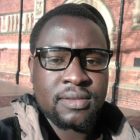 Benon Herbert Oluka, GIJN’s Africa editor, is a Ugandan multimedia journalist. Benon is a mentor for the 2023/2024 African Union Media Fellowship cohort. His work has been recognized three times on the African continent as the winner of the 2008 Akintola Fatoyinbo Africa Education Journalism Award (First Prize, English category), the 2011 CNN-MultiChoice African Journalist of the Year Award (Tourism category), and the Thomson Reuters’ 2011 Niall FitzGerald Prize for Young African Journalists.
Benon Herbert Oluka, GIJN’s Africa editor, is a Ugandan multimedia journalist. Benon is a mentor for the 2023/2024 African Union Media Fellowship cohort. His work has been recognized three times on the African continent as the winner of the 2008 Akintola Fatoyinbo Africa Education Journalism Award (First Prize, English category), the 2011 CNN-MultiChoice African Journalist of the Year Award (Tourism category), and the Thomson Reuters’ 2011 Niall FitzGerald Prize for Young African Journalists.






